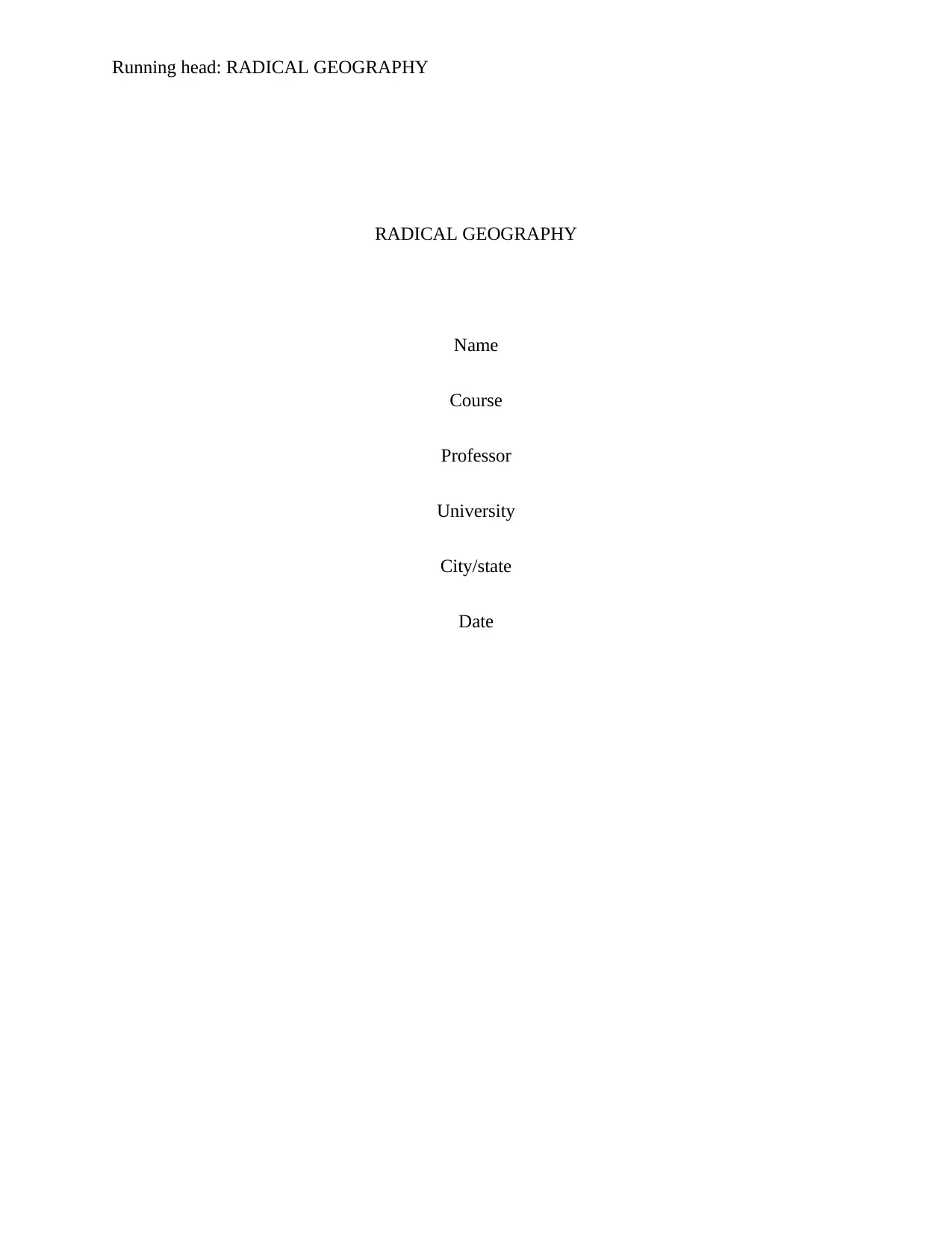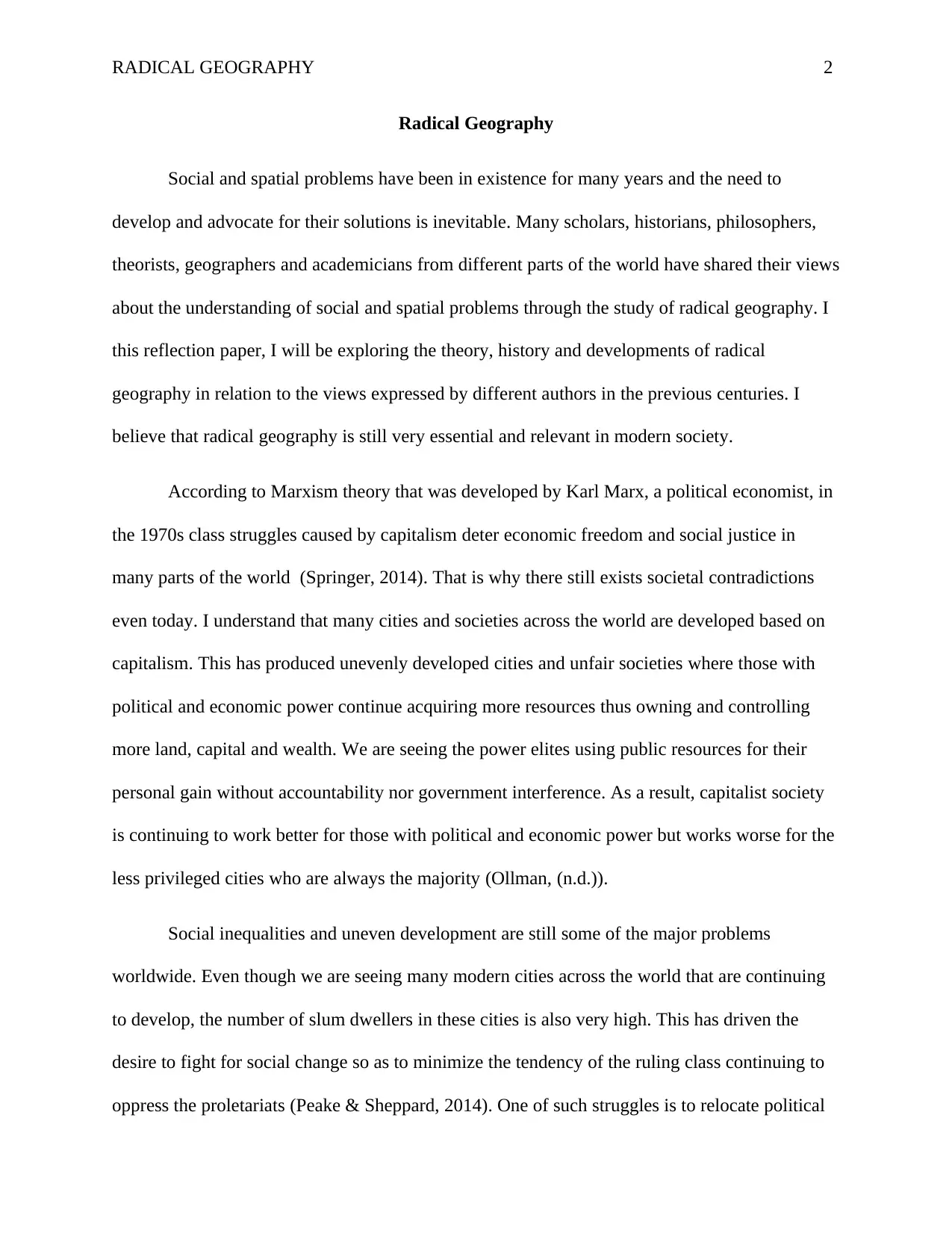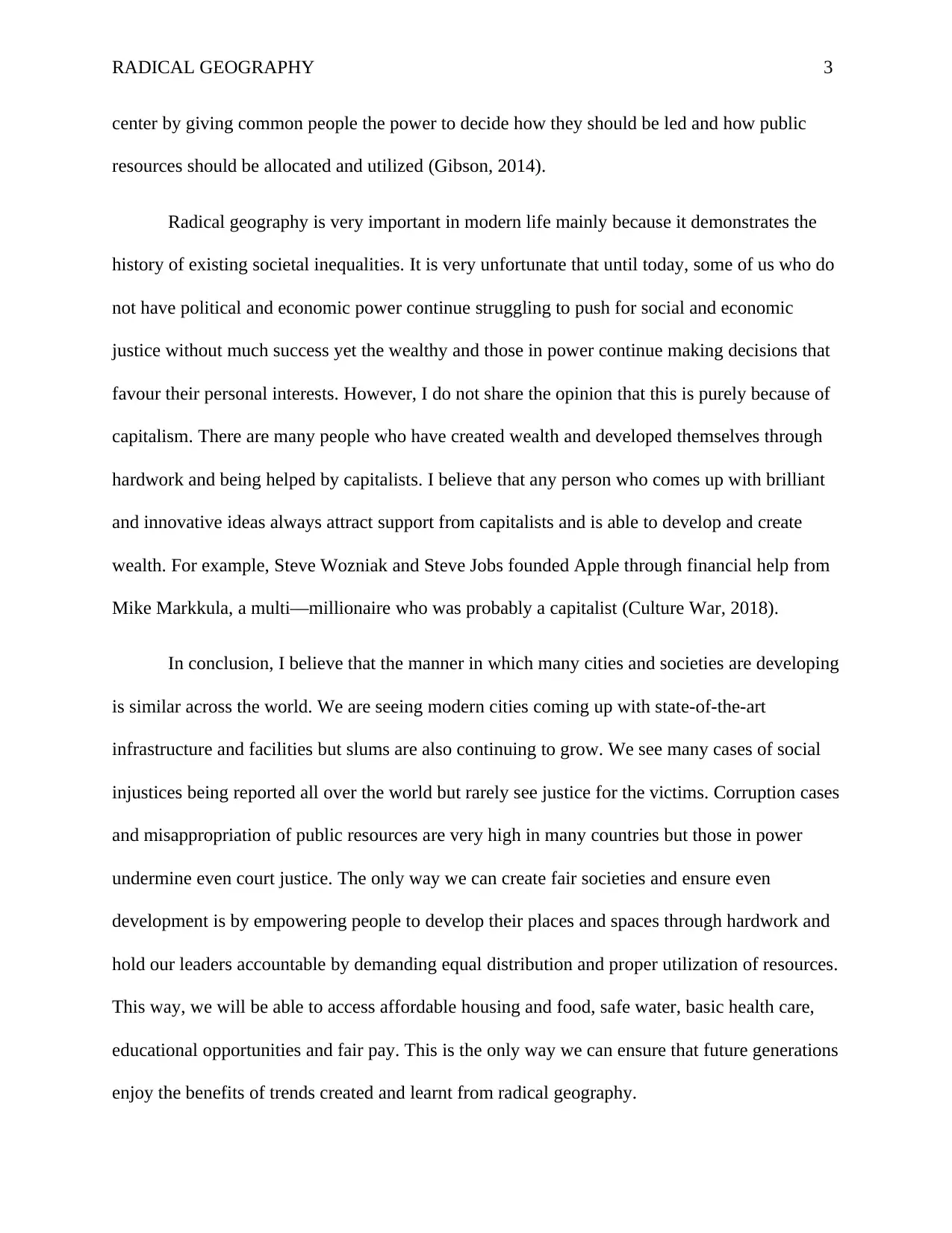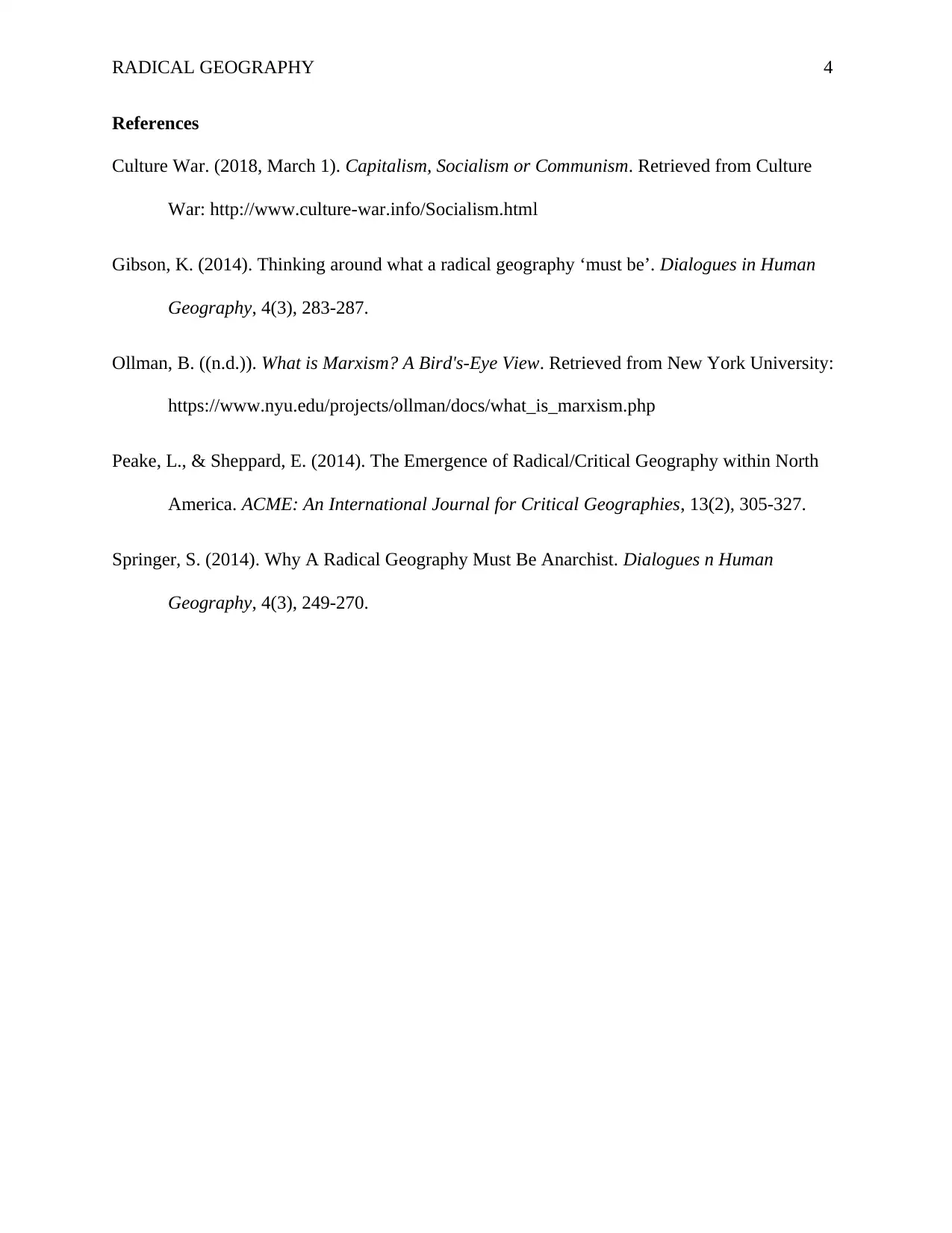Radical Geography: A Critical Analysis of Social and Spatial Justice
VerifiedAdded on 2023/06/03
|4
|882
|99
Essay
AI Summary
This essay reflects on the theory, history, and modern relevance of radical geography, particularly in addressing social and spatial problems. Drawing from Marxist theory, the paper discusses how capitalism contributes to uneven development and social inequalities, leading to class struggles and the concentration of power and resources among elites. While acknowledging the negative impacts of unchecked capitalism, the essay also recognizes the role of capitalism in fostering innovation and wealth creation. It concludes by advocating for empowering individuals through hard work and holding leaders accountable to ensure equitable resource distribution, access to basic necessities, and ultimately, a more just and developed society for future generations. The essay emphasizes that Desklib provides access to similar solved assignments and resources for students.

Running head: RADICAL GEOGRAPHY
RADICAL GEOGRAPHY
Name
Course
Professor
University
City/state
Date
RADICAL GEOGRAPHY
Name
Course
Professor
University
City/state
Date
Paraphrase This Document
Need a fresh take? Get an instant paraphrase of this document with our AI Paraphraser

RADICAL GEOGRAPHY 2
Radical Geography
Social and spatial problems have been in existence for many years and the need to
develop and advocate for their solutions is inevitable. Many scholars, historians, philosophers,
theorists, geographers and academicians from different parts of the world have shared their views
about the understanding of social and spatial problems through the study of radical geography. I
this reflection paper, I will be exploring the theory, history and developments of radical
geography in relation to the views expressed by different authors in the previous centuries. I
believe that radical geography is still very essential and relevant in modern society.
According to Marxism theory that was developed by Karl Marx, a political economist, in
the 1970s class struggles caused by capitalism deter economic freedom and social justice in
many parts of the world (Springer, 2014). That is why there still exists societal contradictions
even today. I understand that many cities and societies across the world are developed based on
capitalism. This has produced unevenly developed cities and unfair societies where those with
political and economic power continue acquiring more resources thus owning and controlling
more land, capital and wealth. We are seeing the power elites using public resources for their
personal gain without accountability nor government interference. As a result, capitalist society
is continuing to work better for those with political and economic power but works worse for the
less privileged cities who are always the majority (Ollman, (n.d.)).
Social inequalities and uneven development are still some of the major problems
worldwide. Even though we are seeing many modern cities across the world that are continuing
to develop, the number of slum dwellers in these cities is also very high. This has driven the
desire to fight for social change so as to minimize the tendency of the ruling class continuing to
oppress the proletariats (Peake & Sheppard, 2014). One of such struggles is to relocate political
Radical Geography
Social and spatial problems have been in existence for many years and the need to
develop and advocate for their solutions is inevitable. Many scholars, historians, philosophers,
theorists, geographers and academicians from different parts of the world have shared their views
about the understanding of social and spatial problems through the study of radical geography. I
this reflection paper, I will be exploring the theory, history and developments of radical
geography in relation to the views expressed by different authors in the previous centuries. I
believe that radical geography is still very essential and relevant in modern society.
According to Marxism theory that was developed by Karl Marx, a political economist, in
the 1970s class struggles caused by capitalism deter economic freedom and social justice in
many parts of the world (Springer, 2014). That is why there still exists societal contradictions
even today. I understand that many cities and societies across the world are developed based on
capitalism. This has produced unevenly developed cities and unfair societies where those with
political and economic power continue acquiring more resources thus owning and controlling
more land, capital and wealth. We are seeing the power elites using public resources for their
personal gain without accountability nor government interference. As a result, capitalist society
is continuing to work better for those with political and economic power but works worse for the
less privileged cities who are always the majority (Ollman, (n.d.)).
Social inequalities and uneven development are still some of the major problems
worldwide. Even though we are seeing many modern cities across the world that are continuing
to develop, the number of slum dwellers in these cities is also very high. This has driven the
desire to fight for social change so as to minimize the tendency of the ruling class continuing to
oppress the proletariats (Peake & Sheppard, 2014). One of such struggles is to relocate political

RADICAL GEOGRAPHY 3
center by giving common people the power to decide how they should be led and how public
resources should be allocated and utilized (Gibson, 2014).
Radical geography is very important in modern life mainly because it demonstrates the
history of existing societal inequalities. It is very unfortunate that until today, some of us who do
not have political and economic power continue struggling to push for social and economic
justice without much success yet the wealthy and those in power continue making decisions that
favour their personal interests. However, I do not share the opinion that this is purely because of
capitalism. There are many people who have created wealth and developed themselves through
hardwork and being helped by capitalists. I believe that any person who comes up with brilliant
and innovative ideas always attract support from capitalists and is able to develop and create
wealth. For example, Steve Wozniak and Steve Jobs founded Apple through financial help from
Mike Markkula, a multi—millionaire who was probably a capitalist (Culture War, 2018).
In conclusion, I believe that the manner in which many cities and societies are developing
is similar across the world. We are seeing modern cities coming up with state-of-the-art
infrastructure and facilities but slums are also continuing to grow. We see many cases of social
injustices being reported all over the world but rarely see justice for the victims. Corruption cases
and misappropriation of public resources are very high in many countries but those in power
undermine even court justice. The only way we can create fair societies and ensure even
development is by empowering people to develop their places and spaces through hardwork and
hold our leaders accountable by demanding equal distribution and proper utilization of resources.
This way, we will be able to access affordable housing and food, safe water, basic health care,
educational opportunities and fair pay. This is the only way we can ensure that future generations
enjoy the benefits of trends created and learnt from radical geography.
center by giving common people the power to decide how they should be led and how public
resources should be allocated and utilized (Gibson, 2014).
Radical geography is very important in modern life mainly because it demonstrates the
history of existing societal inequalities. It is very unfortunate that until today, some of us who do
not have political and economic power continue struggling to push for social and economic
justice without much success yet the wealthy and those in power continue making decisions that
favour their personal interests. However, I do not share the opinion that this is purely because of
capitalism. There are many people who have created wealth and developed themselves through
hardwork and being helped by capitalists. I believe that any person who comes up with brilliant
and innovative ideas always attract support from capitalists and is able to develop and create
wealth. For example, Steve Wozniak and Steve Jobs founded Apple through financial help from
Mike Markkula, a multi—millionaire who was probably a capitalist (Culture War, 2018).
In conclusion, I believe that the manner in which many cities and societies are developing
is similar across the world. We are seeing modern cities coming up with state-of-the-art
infrastructure and facilities but slums are also continuing to grow. We see many cases of social
injustices being reported all over the world but rarely see justice for the victims. Corruption cases
and misappropriation of public resources are very high in many countries but those in power
undermine even court justice. The only way we can create fair societies and ensure even
development is by empowering people to develop their places and spaces through hardwork and
hold our leaders accountable by demanding equal distribution and proper utilization of resources.
This way, we will be able to access affordable housing and food, safe water, basic health care,
educational opportunities and fair pay. This is the only way we can ensure that future generations
enjoy the benefits of trends created and learnt from radical geography.
⊘ This is a preview!⊘
Do you want full access?
Subscribe today to unlock all pages.

Trusted by 1+ million students worldwide

RADICAL GEOGRAPHY 4
References
Culture War. (2018, March 1). Capitalism, Socialism or Communism. Retrieved from Culture
War: http://www.culture-war.info/Socialism.html
Gibson, K. (2014). Thinking around what a radical geography ‘must be’. Dialogues in Human
Geography, 4(3), 283-287.
Ollman, B. ((n.d.)). What is Marxism? A Bird's-Eye View. Retrieved from New York University:
https://www.nyu.edu/projects/ollman/docs/what_is_marxism.php
Peake, L., & Sheppard, E. (2014). The Emergence of Radical/Critical Geography within North
America. ACME: An International Journal for Critical Geographies, 13(2), 305-327.
Springer, S. (2014). Why A Radical Geography Must Be Anarchist. Dialogues n Human
Geography, 4(3), 249-270.
References
Culture War. (2018, March 1). Capitalism, Socialism or Communism. Retrieved from Culture
War: http://www.culture-war.info/Socialism.html
Gibson, K. (2014). Thinking around what a radical geography ‘must be’. Dialogues in Human
Geography, 4(3), 283-287.
Ollman, B. ((n.d.)). What is Marxism? A Bird's-Eye View. Retrieved from New York University:
https://www.nyu.edu/projects/ollman/docs/what_is_marxism.php
Peake, L., & Sheppard, E. (2014). The Emergence of Radical/Critical Geography within North
America. ACME: An International Journal for Critical Geographies, 13(2), 305-327.
Springer, S. (2014). Why A Radical Geography Must Be Anarchist. Dialogues n Human
Geography, 4(3), 249-270.
1 out of 4
Related Documents
Your All-in-One AI-Powered Toolkit for Academic Success.
+13062052269
info@desklib.com
Available 24*7 on WhatsApp / Email
![[object Object]](/_next/static/media/star-bottom.7253800d.svg)
Unlock your academic potential
Copyright © 2020–2026 A2Z Services. All Rights Reserved. Developed and managed by ZUCOL.




